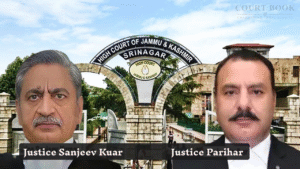The Supreme Court of India recently ruled that a magistrate does not have the authority to direct the police to include a person’s name in a charge sheet. Instead, if the court finds sufficient grounds, it may issue a summons to the proposed accused. This landmark judgment clarifies the legal procedure for adding an accused person to a criminal case.
A bench comprising Justice Ahsanuddin Amanullah and Justice Prashant Kumar Mishra delivered this verdict while hearing a case where the petitioner was included in the police's charge sheet on the direction of the Magistrate. The Chhattisgarh High Court had upheld this order, leading the petitioner to challenge the decision in the Supreme Court.
Read Also:- Supreme Court Strikes Down Mandatory Arrest Condition in Bail Order
Case Background
The case involved Gopal Pradhan vs. State of Chhattisgarh & Ors. The petitioner, Gopal Pradhan, contested the order passed by the Judicial Magistrate, First Class, Pithora, District Mahasamund, Chhattisgarh, on April 13, 2018, in Criminal Case No. 454 of 2017. The magistrate had ordered that his name, along with another person’s, be included in the charge sheet, effectively making him an accused in the case.
The petitioner argued that the High Court erred in upholding the Magistrate’s directive. He contended that there is no provision in Criminal Procedure Code (Cr.P.C.) that allows a magistrate to instruct the police to include a person in the charge sheet. The police had completed their investigation and filed the Final Report, which did not name him as an accused. Despite this, the magistrate not only directed his inclusion in the charge sheet but also issued summons against him.
The Supreme Court agreed with the petitioner’s argument, emphasizing that a Judicial Magistrate has no authority to direct the police to add names to the charge sheet. Instead, if the magistrate finds sufficient evidence, they should take cognizance of the offense and directly issue summons to the concerned person.
"We find some technical merit in the contention of the learned counsel for the petitioner. The Court has the power to differ from the Final Form submitted by the Police and take cognizance of a crime and also against persons who may not have been sent up for trial by the Police after investigation."
Read Also:- Supreme Court Restores Conviction in Child Rape Case After 38 Years, Criticizes High Court's Acquittal
The court further clarified:
"In such circumstances, the Court is then required to issue summons instead of directing for inclusion of the name of the person in the charge sheet. Thus, ultimately, the result is the same – the person concerned is arrayed as an accused upon taking cognizance after application of mind by the Court and accordingly, summons are issued."
Despite acknowledging the procedural error by the Magistrate, the Supreme Court noted that the final outcome – the issuance of summons – was legally valid. As a result, the Court declined to interfere with the High Court’s decision and dismissed the Special Leave Petition.
"Thus, the order which in essence is of summons as an accused, cannot be faulted."
Advocates for the petitioner: Mr. Abhinav Shrivastava, AOR, Mr. Bajrang Agrawal, Adv., Ms. Unnati Vaibhav, Adv.
Case Title: Gopal Pradhan vs. State of Chhattisgarh & Ors.















